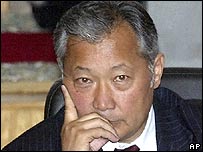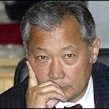
Bakiyev Strengthens Control over Armed Forces Ahead of Opposition Revolts
Publication: Eurasia Daily Monitor Volume: 6 Issue: 15
By:

Kyrgyz President Kurmanbek Bakiyev’s recent personnel reshuffles have shown that he is concerned about a potentially unstable spring as well as presidential elections tentatively scheduled for 2010. Bakiyev has replaced all heads of security structures and revamped cadres in his administration. Furthermore, in December he ordered the parliament to allow the Defense Ministry’s armed forces to intervene in domestic affairs. Finally, Bakiyev is frantically seeking Russian support in 2009 and 2010.
The Kyrgyz opposition has united several political parties and movements and is preparing to challenge Bakiyev this spring and demand his resignation (see EDM January 8). Following regular cutoffs of electricity and a steep increase of in the price of utilities, the opposition has a good chance to mobilize the masses against the regime. In the past year Bakiyev appointed his brother Zhanysh Bakiyev to head the National Security Guard, while his son Marat leads the National Security Service. His crony Adakhan Madumarov heads the Security Council, his former personal guard Bakytbek Kalyev is defense minister, and Moldomusa Kongantiev, another close friend, is minister of internal affairs.
Despite these appointments, opposition leaders have hoped that lower-ranking military personnel would refuse to support the president and government in case of organized mass demonstrations. Rumors in Bishkek suggest, however, that Bakiyev is planning to relocate more Defense and Interior Troops from southern Kyrgyzstan to the capital in case the opposition begins rioting. By doing so, the president hopes to secure support of lower-ranking personnel.
Opposition leaders are well informed about Bakiyev’s intentions and are still seeking to establish ties with the armed forces on their own. Bakiyev, however, is sabotaging such attempts by prosecuting the well-respected Mayor General Ismail Isakov, who might have considerable influence with the security organizations. Isakov served as defense minister as well as head of the Security Council from 2005 to 2008. He is currently a member of the opposition bloc United Opposition.
During the mass riots in March 2005 that eventually resulted in a change of regime, the army was deployed in Bishkek to guard the streets but was never ordered to intervene in civilian protests. This spring, however, the likelihood of the armed forces breaking up the protests has increased significantly. Should troops ever be deployed in Bishkek, they would be mostly newly recruited conscripts lacking proper political or military training. Conscripts typically lack a clear understanding of their role in national security and fear corporal punishment from sergeants and commanders.
Since gaining independence in 1991 Kyrgyzstan has never allowed Defense Ministry forces to intervene in internal affairs. According to a public statement by the NGO Coalition for Democracy and Civil Society, by allowing defense ministry troops to operate together with the police, parliament is flouting the constitutional rights of Kyrgyz citizens (www.akipress.kg, January 9).
Meanwhile, Bakiyev’s long-time supporter Meder Sadyrkulov resigned from his position as head of the president’s administration on January 8 (www.akipress.kg, January 8). Most Kyrgyz pundits see his resignation as a tactic by Bakiyev to solidify his support in the administration prior to a turbulent spring and the 2010 presidential elections (www.24.kg, January 9). The president replaced Sadyrkulov with Daniyar Usenov, one of Kyrgyzstan’s most influential businessmen. Usenov previously occupied several high posts, and was despised by a number of deputies from the previous parliament.
The president is also trying to boost relations with Russia. The pro-regime media have spread rumors that Bakiyev is planning to shut down the U.S. military base before his proposed visit to Russia this year. Several international news agencies have picked up on this as well. Commander of United States Central Command General David Petraeus, however, denied this speculation during his visit to Astana (BBC, January 14).
Kyrgyz Prime Minister Igor Chudinov is currently in Moscow to meet with his Russian counterpart Vladimir Putin for the second time since December. At that time, Chudinov and Putin discussed Russia’s pledge to allocate $2 billion in credit to support Kyrgyzstan’s economy and hydroelectric sector. Putin had promised this loan as early as in August 2007, before the Shanghai Cooperation Organization summit, when he still was a president. The promise of the generous credit has been in the Russian and Kyrgyz media, but the conditions and terms have never been made public.
Loyal security forces, reshuffles in the presidential administration, and efforts to secure the Kremlin’s support are all part of Bakiyev’s preparations for riots in the spring. Bakiyev might, however, challenge his own power by relying too heavily on the security structures. Kyrgyzstan has no precedent of the army intervening in civilian life. When police forces shot five protestors dead in the village of Aksy in March 2002, it almost cost Askar Akayev his presidency.




